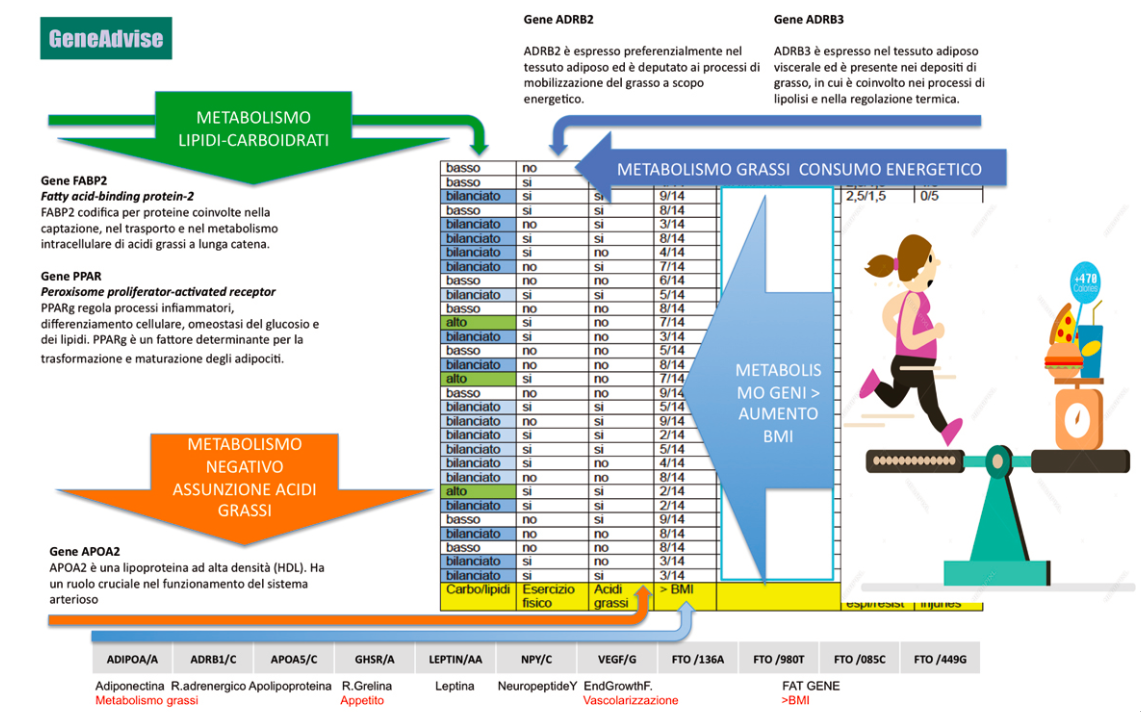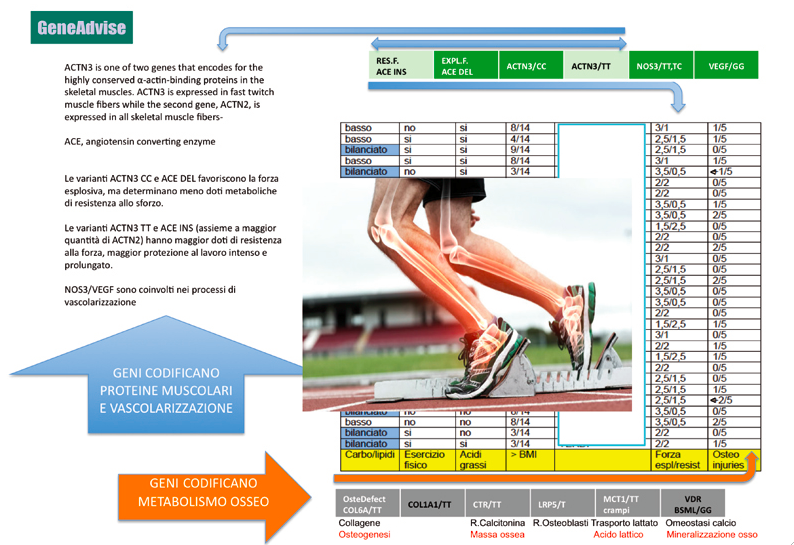
![]()
QUESTO E' IL REPORT CHE VOLETE!
LA VOSTRA GENETICA METABOLICA REGOLA IL COMPLESSO CARBOIDRATI-LIPIDI
LO SCOPO E' MIGLIORARE L'EFFICIENZA DELL'ORGANISMO
LA GENETICA METABOLICA NON PREVEDE RISCHI MALATTIA E NON VI ELENCA
LE BANANE O LE PERE CHE DOVETE MANGIARE ...... PER LE RICETTE .... CHIEDERETE AL NUTRIZIONISTA
GENE-PERSONA
E' STRUMENTO SEMPLICE, RAPIDO, CHIARO PER ORGANIZZARE CIBO E ATTIVITA' SPORTIVA
IL FASCICOLO ILLUSTRA TUTTE LE VARIANTI GENETICHE E LO SCHEMA DI INTERAZIONE
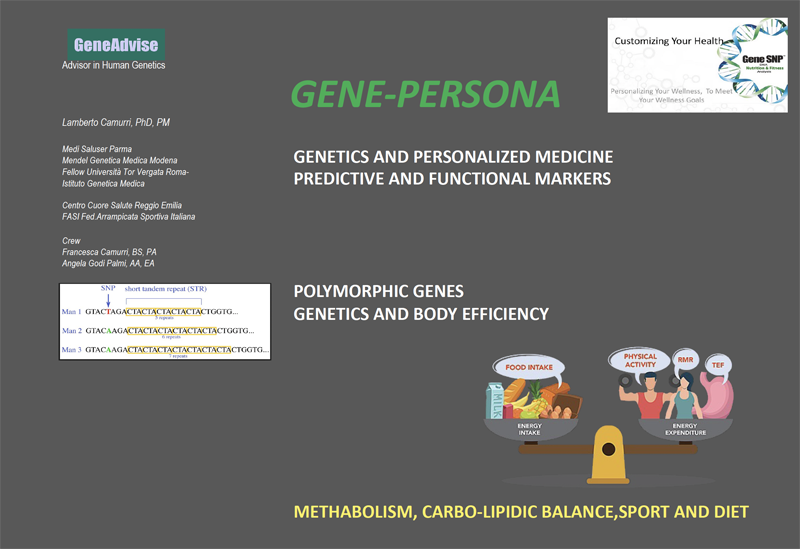
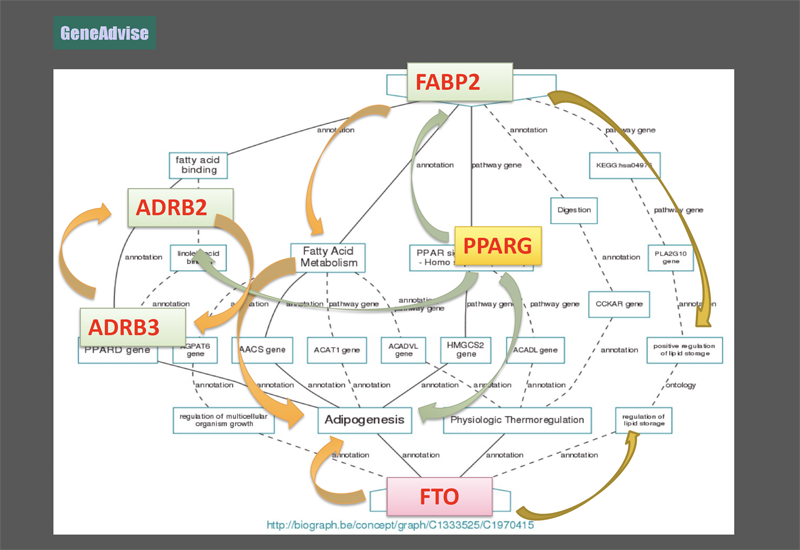
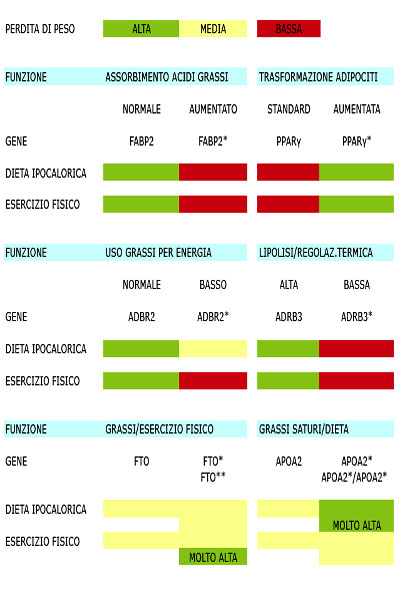
METABOLISMO DEL COMPLESSO CARBOIDRATI-LIPIDI, ACCUMULO DEI GRASSI, INSULINORESISTENZA, ACIDI GRASSI, AUMENTO DI PESO, ESERCIZIO FISICO E DIMAGRIMENTO
FUNZIONALITA' OSTEO TENDINEA, MUSCOLARE E CIRCOLATORIA

PERFORMANCE TEST, INJURY TEST, WEIGHT CONTROL, SALUTE CARDIOVASCOLARE
GENESLIM - GENEFIT I geni che regolano l’accumulo e il consumo dei grassi sono diversi per ogni individuo e possono essere studiati. Dalle loro informazioni escono messaggi importanti, con i quali si comprende se una persona è predisposta ad accumulare i grassi assunti con la alimentazione ovvero a consumarli in fretta. Le conseguenze sono presto immaginabili specialmente se dallo studio dei geni si può sapere anche se sia più importante la dieta per il raggiungimento della forma ovvero il consumo energetico sportivo, e in più che tipo di dieta e che intensità di esercizio.
Almeno sette sono i geni importanti che svolgono varie funzioni: assorbimento degli acidi grassi, la trasformazione (quindi consumo) delle cellule di adipe, l’utilizzo dei grassi per produzione di energia, l’uso dei grassi per la regolazione termica del corpo, infine geni che rendono sensibile l’organismo al deposito di grassi rispetto a dieta e/o esercizio fisico.
Questi geni, presenti in ogni individuo, hanno ciascuno due forme o varianti diverse, legate a alta o bassa efficienza per la funzione a cui sono deputati. La osservazione e la combinazione di queste varianti consente di ottenere un preciso profilo di predisposizione personale nell’ambito dell’accumulo o consumo di grassi e carboidrati.
Oltre all’uso del test nel campo della ricerca del benessere e del mantenimento del peso forma, anche nella attività dello sportivo motivato, professionista o dilettante che sia, è importante la conoscenza delle attitudini genetiche al metabolismo dei grassi. Conoscere la efficienza metabolica del proprio organismo sia nell’uso dell’apporto dietetico che dell’esercizio fisico consente di programmare la attività di allenamento e agonistica in modo ottimale, modulando la alimentazione senza incorrere in difetti o eccessi di assunzione di alimenti.
PARTNERSHIP
![]()
KJ restriction protects chromosomes
Thursday, January 24, 2013
One of the indicators of a cell's health is the state of its DNA and containers—the chromosomes—so when these fuse together or suffer anomalies, they can become the source of illnesses like cancer and/or ageing processes. According to a study carried out by a team led by María Blasco, the director of the Spanish National Cancer Research Centre (CNIO) and head of the Telomeres and Telomerase Group, a sustained lowering of food intake over time results in an increase of telomere length—the ends of chromosomes—in adult mice, which has a protective effect on the DNA and genetic material. These beneficial effects on the youth of the chromosomes translate to a lower incidence of cancer and other age-related illnesses. The journal PLOS ONE is to publish the details of this study in its online edition. A lower incidence of cancer and better health To carry out the study, researchers used young mice—just three months old—and reduced their kilojoule intake by 40% before observing them until the end of their life cycle. "We see that mice that undergo caloric restriction show a lower telomere shortening rate than those fed with a normal diet," says Blasco. "These mice therefore have longer telomeres as adults, as well as lower rates of chromosome anomalies," she adds. To study the effects of this phenomenon on the health of the mammals, researchers observed the incidence of age-related illnesses like cancer. The mice that had been fed a lower kilojoule intake showed a reduction in the incidence of cancer. Furthermore, these mice also showed a lower incidence of other age-related illnesses such as osteoporosis, greater glucose uptake or improvements in motor coordination. When the researchers carried out these same experiments with a variety of mice that produce more telomerase—a protein that lengthens telomeres and protects chromosomes—they observed that these mice not only enjoyed better health but also lived up to 20% longer. "We believe that such a significant increase in longevity is due to the protective effect against cancer produced by kilojoule restriction—incidences fall by 40% if we compare them with the mice that produce more telomerase and have a normal diet—and, added to the presence of longer telomeres, this makes the mice live longer and better," says Blasco. New avenues of research available Despite the effects of kilojoule restriction depending on the genetic characteristics of each organism, this study opens the way to studying the effect other factors and lifestyle habits, such as smoking or exercise, might have on ageing. Furthermore, it is calculated that there are currently more than 10 000 people in the world on some form of controlled caloric restriction, so the observation of these individuals will be decisive in discovering the effects of this type of diet on humans.

